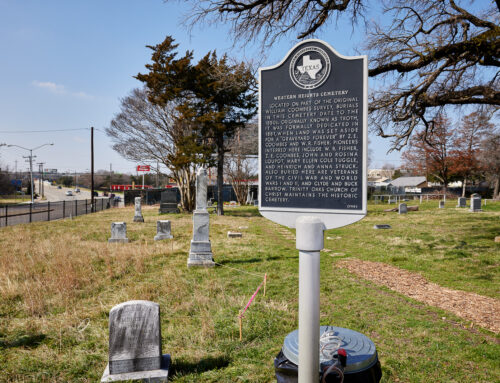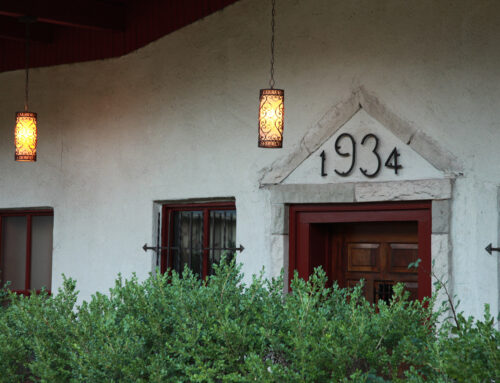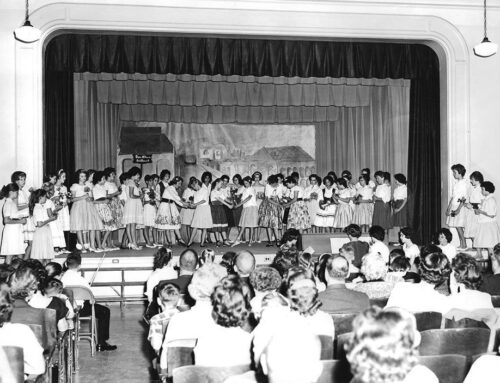Oak Cliff business tycoon C.R. McHenry collaborated with Texas billionaire and later Hollywood producer, Howard Hughes to fulfill his dream of an elegant movie house in Oak Cliff. The result?
The Texas Theatre.

However, during 1930 construction, silent movies were rapidly becoming relics. Construction halted to redesign the acoustics, and add what was then considered state-of-the-art sound technology and a Barton organ. Thus, the Texas became the first Dallas theater to show “talkies” … and provide air-conditioning — the largest suburban house in the Southwest.
Originally, the 1,000-seat Spanish-Moorish motif theater displayed elaborately painted interior walls and plush custom carpeting. With elevated box seats flanking the stage, and specially designed backlighting for the extensive architectural details extending upward to the cloud- and star-painted four-story ceiling, this movie palace was impressive.
At the April 21, 1931, opening, Cliffite Billie Paul Mount, an industrious 14-year-old, became the first customer to pass through the theater doors. Hired to pass out fliers announcing the theater’s opening, he received movie passes instead of a paycheck. He arrived early and stood at the main entrance, determined to be the first one into the beautiful interior.
And it worked. The now 91-year-old Mount (Sunset High School ’37) is still proud of his accomplishment.
During the ’30s and ’40s, most Cliffites headed to the Texas Theatre at one time or another. With easy streetcar access and a location midway between Sunset and Adamson high schools, it was convenient and affordable Depression- and war-era entertainment.
From 1947 to 1969, the Texas hosted the forerunner of what is now the annual Oak Cliff Lions Club “Extravaganza”. After a 35-year hiatus, the event returned to the partially renovated theater in 2008 and 2009.
To the public at large, the Texas normally invokes thoughts of 1963, when presidential assassin Lee Harvey Oswald was captured inside at approximately 1:45 p.m. But to Cliffites of my parents’ generation and mine, the theater is an icon of our growing-up years.
The building’s appearance began declining during the late ’50s and early ’60s. But for many of us, it was still the place to be on Saturday mornings if you were a kid, and on Friday and Saturday nights as well as Sunday afternoons, if you were a teen. I enjoyed both.
For roughly $1 or so, patrons under 12 could enjoy several hours of food and fun. With admission between 15 and 25 cents, it was still possible to purchase a hot dog, a soft drink, a box of popcorn, a candy bar and a 5-cent pickle, and still have a dime left over to call home and request being picked up by your parents. (No cell phones back then.)
I remember going to the Texas to see Elvis do his thing in “Jailhouse Rock”, and a junior high date taking me to see “Judgment at Nuremberg”. And on Sunday afternoons, when almost nothing was open due to the Blue Law, going with friends to see a Vincent Price flick like “House on Haunted Hill” or “The Tingler” gave us something to do, although I’m not sure it was a good time investment. (Doing homework or studying might have been a better choice. No offence, Vincent.)
I paid admission there, as a young adult, to see the “Odd Couple”. I believe I even saw “Gone With the Wind” for the first time at the Texas Theatre.
Unfortunately, the multi-screen suburban theater changed the landscape. In 1989, the Texas officially closed.
If I could turn back the clock and walk through the doors again, I believe I’d be able to endure another round of “The Tingler” or dodge whatever happened to be lobbed down on me from the balcony. I’d just dig in my purse and pull out a nickel for a pickle … and then a dime to call home.
Haven’t been to the Texas Theatre lately? Head there Saturday, March 20 at 7 p.m. to watch a movie made right here in Oak Cliff. “Angels Love Donuts” was written by Oak Cliff natives Leon McWhorter (Carter ’72) and Alan Elliott (Adamson ’70), adapted from a stage play the pair originally wrote for the Tyler Street United Methodist Church drama group, the CrossWise Players. Tickets are $10, and proceeds benefit neighborhood organizations. Call 214.330.8478 or visit crosswiseplayers.com for tickets and more information.





